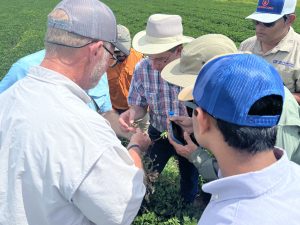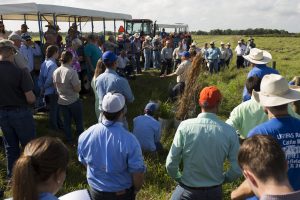Billie Rooney and her husband, Scott, run a 40-acre farm near Live Oak, where they grow blueberries, blackberries and sunflowers and raise livestock.
Farming is a second career for the Rooneys. So, they had a lot to learn.
She and hundreds of other farmers and ranchers across Florida can attest to the importance of lessons learned from any of the 150 or so annual field days hosted by the University of Florida Institute of Food and Agricultural Sciences (UF/IFAS).
“We went from nothing to having a successful operation,” Billie Rooney said of what she learned at educational sessions at the North Florida Research and Education Center-Suwannee Valley (NFREC-SV).
At field days, agricultural producers — large and small, beginners to veterans — can learn about topics that can increase their yields and preserve the environment. They get updates on the latest varieties of crops and forages along with how to manage heat, climate change, pests and diseases. Agricultural producers can take knowledge back to their operations and put it to work.

Usually, stakeholders go to research and education centers and other UF/IFAS sites from the Panhandle to South Florida, but sometimes UF/IFAS takes its science-based information to agricultural producers.
UF/IFAS offers a wide range of learning opportunities at field days across the state. Held primarily for growers, topics include cattle, forage, citrus, specialty crops including watermelons, grapes, peanuts and much more.
“The success of these field days is due to collaborative efforts of Extension agents and specialists,” said Saqib Mukhtar, UF/IFAS associate dean of Extension for agriculture and natural resources. “Stakeholders’ input and local needs assessment contribute to the hands-on learning opportunities at these UF/IFAS educational events.”
Field days are typically done to show research or demonstrations being conducted by UF/IFAS faculty or staff, said Bob Hochmuth, assistant director of NFREC-SV.
“We show research projects in the field or greenhouses,” Hochmuth said. “We often also use them as training opportunities. Field days may be conducted at a research and education center (REC); however, we offer many on farms where we are conducting research or demonstration projects.”
“The information is usually new, cutting edge and not readily available yet,” Hochmuth said. “So, it increases their knowledge, not only by hearing or reading about it, but actually seeing it. And seeing it live is believing in most cases and is known to be a great way to learn.”
Like the Rooneys, Kim Jones, owner of Florida Georgia Citrus in Jefferson County, learns a lot at field days.
Among the many take-home lessons for Jones are proper handling of fruit, appropriate use of chemicals, nutritional needs for citrus and pest identification. He also appreciates the new citrus handbook available at field days.
“I’m always trying to learn more about growing citrus,” said Jones, who’s been growing cold-hardy citrus for a decade. “I find out about food safety issues, I network with other growers and share what we know.”
“I’ve learned information at field days that has helped me make better management decisions,” he said. “That ranges from nutrient rates to chemicals that works best.”
Cattle field days
At the Range Cattle Research and Education Center (RCREC) in Hardee County, scientists hold two official field days each year: the Ona Field Day and the Ona Youth Field Day. The first targets ranchers and land-use managers; the other teaches youth about everything from ranching to hay to water conservation.

“At our field days, we highlight the results of our research by showing experimental plots or demonstration plots,” said center director Brent Sellers.
Scientists at the RCREC try to come up with logical methods to answer questions so that clientele can implement new and/or different management techniques.
“Ultimately, we like to see behavior change – clientele come to the center (or we go to them), learn something new/different, and they implement change at their location,” Sellers said.
Longtime rancher regularly attends, finds practical information
Mike Adams, owner and president of the Adams Ranch, said his family has been attending field days at RCREC for generations. His dad started going to Ona Field Day after World War II.
Based in Fort Pierce, Adams Ranch covers about 45,000 acres in St. Lucie, Okeechobee, Osceola and Madison counties, with about 7,400 cows.
During one recent visit to Ona Field Day, Adams learned about Gibgrass, a species of Limpograss that scientists at RCREC evaluated, and he used them right away to feed his cattle.
“I kind of go to all of them,” Adams said. “They’re working on different grasses. Once the grasses get released, we’ve gone right back and tried them. They’ve been a real benefit to our operation.”
He also appreciates that you can see research on many acres, which reflects an actual ranch. For example, agronomy professor Joao Vendramini can plant 50 acres of new forage, have it eaten by the cattle at the center and then test it on your own operation.
“You can actually see some of the things on a scale that’s more relatable,” Adams said.
“You have some type of certainty that this is going to work.”
Farm Bureau connection
Jeb Smith, president of the Florida Farm Bureau, calls UF/IFAS field days “invaluable.”
“Farmers and ranchers seek the most up-to-date information on agricultural conservation practices that are both effective and economically feasible,” Smith said. “As a farmer who has attended and participated in multiple field days over the years, I have seen first-hand how these workshops provide producers an opportunity to learn from their peers, interact with experts in a supportive atmosphere and gain the practical knowledge to produce a safe and affordable food supply, all while protecting the land for future generations.”
“Florida Farm Bureau is proud to partner with UF/IFAS Extension by sponsoring grower education opportunities, which further Florida Farm Bureau’s mission of increasing the net income of farmers and ranchers, and to improve the quality of rural life,” Smith said.
Pesticide Information
As a bonus at many of the field days, UF/IFAS provides instruction on the latest in pesticide regulations.
These updates are especially important now, as UF/IFAS teaches stakeholders to adapt to U.S. Environmental Protection Agency (EPA) rules. The newest updates are the most significant for pesticides since the formation of the EPA in the 1970s.
These updates will continue to be shared at field days and other training events across the state. Pesticides are a critical part of agricultural production and staying up to date is critical, and the PIO and UF/IFAS extension are here to help, Bultemeier said.
“In addition to the other techniques and skills displayed during a field day, one that is often overlooked is pesticide safety and compliance,” said Brett Bultemeier, Extension assistant professor at the UF/IFAS Pesticide Information Office (PIO). “It is a critical one for farmers. To use pesticides, they must get and maintain a pesticide license. Field days are a great way for farmers to earn continuing education units (CEUs) toward that training and to avoid having to take their pesticide test again. Most farmers don’t want to retest, so CEUs are helpful.”
Sometimes, Bultemeier goes to the field days personally. Sometimes, a county Extension agent provides the training.
In addition, he often works to make the trainings fun and stresses the importance of the content.
“At the end of the day it’s to keep farmers, their employees and their families as safe as possible,” Bultemeier said.
###
ABOUT UF/IFAS
The mission of the University of Florida Institute of Food and Agricultural Sciences (UF/IFAS) is to develop knowledge relevant to agricultural, human and natural resources and to make that knowledge available to sustain and enhance the quality of human life. With more than a dozen research facilities, 67 county Extension offices, and award-winning students and faculty in the UF College of Agricultural and Life Sciences, UF/IFAS brings science-based solutions to the state’s agricultural and natural resources industries, and all Florida residents.
 3
3
